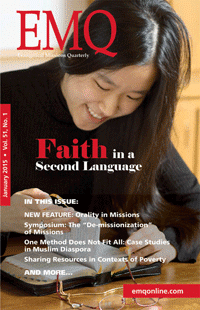Bridging the Divide(s)

by Gary Corwin
It has been my privilege for the last five years to be part of the leadership team for a network known as Bridging the Divide (BtD). Its purpose is to be a forum for scholars, practitioners, and church leaders committed to the proposition that Muslims should have the best possible opportunities to hear and respond to the gospel of Jesus Christ, and to be enfolded into his worldwide Church. The challenge is knowing how to accomplish that without the social and cultural attachments of their birth being lost unnecessarily.
As its name implies, this network came into being because there are substantial differences concerning what is and what is not biblically, ethically, and culturally necessary and appropriate in this endeavor. More specifically, the divide is around what has come to be known as Insider Movements (IM), and whether it is possible to live faithfully as “Muslim followers of Christ.”
I am one who for twenty years has had serious concerns with this development—whether it is in fact a biblically permissible approach and, because of the ethical considerations involved, whether it will negatively impact the long-term health of church development among predominantly Muslim peoples. My concerns remain, but I have come to see that IM advocates, or “alongsiders” as they generally prefer to be called, share a large assumption with “concerned citizens” such as myself. That assumption concerns the lengthy process that it often takes for a new follower of Christ from a Muslim background to understand and respond to the gospel in the first place, and to fully grasp and respond to its implications for lifestyle change.
The four BtD consultations so far, and the ongoing email dialogue that has accompanied them, have not to my knowledge produced “knock-out punches” of insight that resulted in people moving from one end of the spectrum of understanding and conviction to the other. They have, however, revealed the complexity of the issues involved. It is clear that for those who are well informed, there are not just two poles of opinion (those who are in favor of IM and those who are not) but a spectrum of opinions related to the various sub-issues involved.
One of the tragedies that has arisen in the broader context of the IM debate is that there have been significant voices on both ends of the opinion spectrum who see the issues in stark black-and-white terms: you are either fully in favor of insider movements or you oppose them fully. These positions are made possible only by staunchly refusing to enter into serious discussion with those of the opposing camp. This is, in my view, both wrong-headed and dishonoring to God.
There is no substitute for humble and loving engagement with fellow believers,
and especially fellow laborers with whom we disagree.
It is, however, an easier stance to maintain. One can simply define the opposition as uniformly reflecting the worst or most outrageous characteristics of anything written or done in defense of that position, or simply refuse to engage because the other side is “unreasonable, uninformed, or guided by unworthy motives.” Unfortunately, at best, this sort of reductionism only results in “straw men” being addressed, instead of the genuine and real issues requiring attention. It has been the effort to provide an alternative to this destructive and eminently unhelpful approach that has been a driving force behind the Bridging the Divide network.
Beyond the practical factors that make such an alternative essential, there is also a clear and strong biblical mandate that requires nothing less. No passage of scripture sums it up better than Colossians 3:12-16:
Put on then, as God’s chosen ones, holy and beloved, compassion, kindness, humility, meekness, and patience, bearing with one another and, if one has a complaint against another, forgiving each other, as the Lord has forgiven you, so you also must forgive. And above all these put on love, which binds everything together in perfect harmony. And let the peace of Christ rule in your hearts, to which indeed you were called in one body. And be thankful. Let the word of Christ dwell in you richly, teaching and admonishing one another in all wisdom…
There is no substitute for humble and loving engagement with fellow believers, and especially fellow laborers with whom we disagree. This kind of engagement is why I love Bridging the Divide. It is actually addressing in adult and God-honoring ways issues that are vitally important to ministry progress among Muslims. It is a model of how I believe God desires his servants to function together.
With that in mind I commend it as a forum model to address not only the divisive issues related to IM, but as a model of engagement that can be fruitfully duplicated in a myriad of contexts where disagreement reigns. While I like thoughtful engagement through well-written articles as much as anyone, there is no substitute for genuine dialogue in community—whether through electronic means or face to face.
For more information on the guiding principles of Bridging the Divide and how it functions, go to btdnetwork.org.
Gary Corwin is staff missiologist with the international office of SIM.
EMQ, Vol. 51, No. 1 pp. 6-7. Copyright © 2015 Billy Graham Center for Evangelism. All rights reserved. Not to be reproduced or copied in any form without written permission from EMQ editors.



